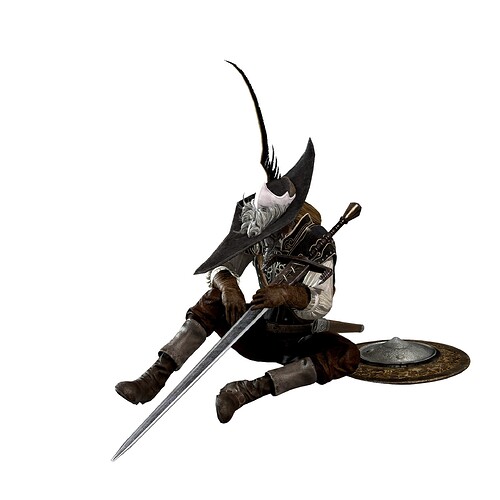Epilogue – “The Fear of Forgetting”
“I’ve found my thoughts growing hazy. My memories are fading, oldest first… The curse is doing its work upon me. I am frightened. Terribly so…
If everything should fade… What will be left of me?
I had an older brother. We learned to fence together. He became the most decorated swordsman in all of Mirrah. I never even compared to him. In fact, I never beat him, not once. But then, one day… he was gone, without a trace. Now I’m certain. That he was taken, by the curse.
If only someone would hear my tale… My brother must have come here, too. Soon, I may forget even about him…”
Lucatiel of Mirrah is the most interesting NPC in the Dark Souls series. Her quest and struggles embody many of the themes of the series, and especially those best defined in Dark Souls II. On her face she appears your bog-standard cool-as-hell looking Dark Souls character, with her big old sword, awesome boots, and creepy mask. She makes fun of you for being a shabby low-level scrub and she can be summoned to beat some of the game’s early bosses. However, in the mid-game she throws a twist at you, pulling off her mask and revealing to the player that she has been afflicted by the curse, her face half-ripened like the raisin-headed ghouls you’ve been slaughtering by the dozens since the game’s tutorial.
The curse is an underappreciated element of the Dark Souls series. It tends to just be there, background noise giving a lore-sanctioned excuse for your rampant murder-spree of otherwise innocent townsfolk and castle guards. I can’t explain to you the series’ stated origin of the curse. Like so much in Dark Souls, it is unnecessarily (but awesomely) convoluted. The important thing is this: The curse represents loss of self. When a character in the Dark Souls universe loses their purpose and drive, they slowly begin to turn into a zombie-like monster. They become violent, they attack the player, they serve to provide souls for you to level up. Of course, Dark Souls is a masterwork of ludonarrative and so this cycle serves a greater storytelling purpose. The curse represents our loss of motivation to go on in a game notorious for its difficulty. The curse embodies a world that has lost its way and its identity – a series of unrelated geometries, full of history and stories but without historians or storytellers to tell them. Lucatiel is the only character in the series that truly represents this central tenet, and her story is all the more moving for it. No NPC in Dark Souls says more than a few paragraphs worth of dialogue, and the quote I listed above represents about 1/5th of Lucatiel’s entire story arc. It gives specificity to her mission and her loss of self and to her struggle with fighting the curse.
When I first played Dark Souls II, I had two brothers. I did not relate to Lucatiel. I didn’t understand how she could lose her way. She spends the game following the trail of her brother – a legendary but prickly knight of Mirrah. Why, in the endgame, does she fail this quest? She gives up at the last moment, succumbing to the curse, despondent and without memory in a ramshackle hut outside the very building where her brother waits for you in ambush.
After my brother died I found myself drawn to Lucatiel. I began to understand her and to empathize with her struggles. As the months have dragged on, I have started to understand her loss, and I have begun to know how the memories of her brother could slip away. And I fear it, the same way that she does. There is an amazingly complicated phenomenon I’ve experienced in the two years since that terrible phone call. That is, resenting and fearing the reduction of pain. In the weeks after his death, the very fact of it was like a splinter under my fingernail. A pain that was constant, flaring up whenever I tried to reach out and do anything of use. But over time the pain has receded, and with it, the bright lines of pain that had etched out my dwindling memories. The edges of him have blurred and shifted and I have rewritten him to be more beautiful and important than perhaps he ever was. In doing so, I am clinging to him, while knowing that I am also diluting his real self. It is tragedy.
I have begun to forget the things about my brother that were real. I can no longer distinguish between what was, and what I have invented in my desire to memorialize him. I remember my brother’s smile. I remember the feel of his hug. I remember him tying my daughter’s shoe. I forget the other details. I have forgotten what it felt like when I feared him as a child. I can no longer feel the shame of his gifts. Someday I will forget the real him, and my memories will only be of other memories. This is the nature of memory, that without new stimuli, our mind is forced to carve out a notion of a past experience. So we end up with a statue of sorts, an ersatz outline of a person who can no longer speak or act for themselves, and so we become the author of their story – but we can never be as good as the original.
He is going away. He is walking into a darkness where I can never go. He turns to me one last time before being obscured by the shadows of memory and he drops me a wink. He says he is sorry. I reach out to him, but he is already gone.
